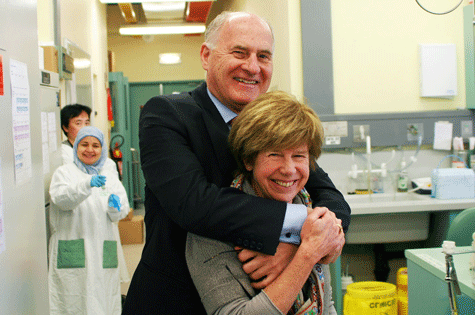World Stroke Day is today, and I thought it an appropriate time to share some of our exciting research news from Centenary Institute’s Vascular Biology laboratory.
This particular research is near and dear to me, as it encompasses not only my own research interests, but also the 32–year partnership I have shared with my Co-Head of this lab who is also my partner in life, Professor Jennifer Gamble.
We first met while doing research into immunology at the Walter and Elisa Hall Institute in Melbourne and we have been at the Centenary Institute for more than five years, starting up the Vascular Biology lab, to focus on understanding blood vessels in health and disease.
What started as a basic study has led to the possibility of a drug that will limit the impact of strokes and heart attacks in patients. We have discovered a compound which helps stop leakage from blood vessels after such cataclysmic events.
Leaky blood vessels are a major cause of some of the damaging and lasting side effects patients experience after stroke or heart attack, including: paralysis; motor and sensory impairments’ and speech and vision difficulties.
There is currently no effective treatment for leaky blood vessels and that is what makes this discovery so exciting.
Heart, stroke and vascular diseases affect around 3.67 million Australians. Of these, 1.1 million people are left permanently disabled. Indeed, you’d be hard pressed to find anyone without a friend or relative who hasn’t suffered from one or both of these terrible diseases.
The discovery of the compound emerged from our research investigating tiny strings of genetic material called microRNAs and was accelerated by our Bioinformatics capacity at Centenary.
We found that one of these microRNAs targets a protein we know to be significant in blood vessel development, and in control of vessel leakage. We found that by blocking the interaction between the microRNA and this protein target we could control leakage.
As you can imagine, we were really excited with this finding! So now we are working with a commercial partner to develop the best formulation to put a stop to blood vessel leakage.
Our plan is that in the coming years, this discovery will lead to a new drug that will be the ‘first line response’ for heart attack and stroke victims. It would be administered by paramedics to immediately stop blood vessel leakage, preventing the permanent damage and disability that would otherwise follow.
Although we have been married for 33 years and worked together for more than 20, we remain constantly surprised at how differently we see things. As usual, we let the experiments decide. This time, we both agree on how exciting it is to discover a new therapeutic approach to improving blood vessel function.
You can help us to continue our lifesaving vascular research by donating to our research at http://www.centenaryfoundation.org.au/event/EffectsOfStroke.
You can also follow updates of our work on our Facebook page or join the conversation on Twitter.

















__small.png)










